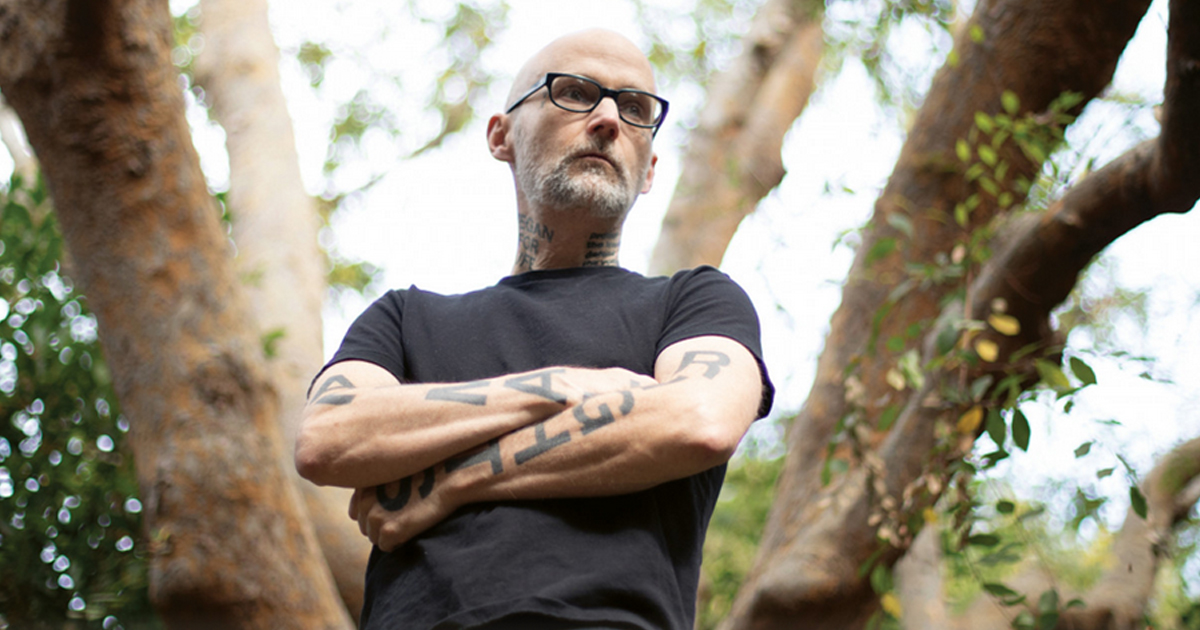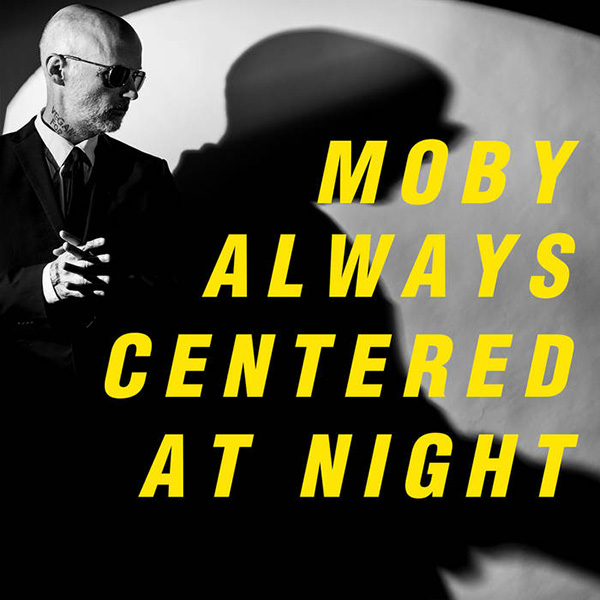Moby's Midnight Noir Meditation, Always Centered at Night: Echoes July CD of the Month
by John Diliberto 06/29/2024
 Moby has always been a collaborator, especially with singers. Guest vocalists occupy spots on most of his albums, and they are usually artists you may not have heard of before. It was especially true on his trilogy of downtempo folk albums, Wait for Me, Destroyed and Innocents. He takes that to an extreme on his latest release, Always Centered at Night. Each track has a different vocalist on it, and with that, a different style. But under Moby’s lush arrangements, somehow, they all come together.
Moby has always been a collaborator, especially with singers. Guest vocalists occupy spots on most of his albums, and they are usually artists you may not have heard of before. It was especially true on his trilogy of downtempo folk albums, Wait for Me, Destroyed and Innocents. He takes that to an extreme on his latest release, Always Centered at Night. Each track has a different vocalist on it, and with that, a different style. But under Moby’s lush arrangements, somehow, they all come together.
Moby’s process on the album was to send the singers backing tracks and perhaps an outline of a vocal melody, then let them take off with the lyrics and often more. For instance, the swampy electronic track, “Transit,” is sung by Gaidaa. She’s a Sudanese singer now living in Holland. She not only sang, in a voice reminiscent of Massive Attack’s Martina Topley-Bird, but wrote the lyrics of loss and change, and arranged her voice into lush choirs. The track moves between a thudding electronica beat and beautiful, piano-centered interludes, and even a flute solo.
Likewise, Akemi Fox, an English R&B singer who is just emerging, created her vocal melody, lyrics and arrangements on the trancey “Fall Back”. It’s a song about depression and escape, as Fox intones, “I want to fall back into a dream.” She wraps her voice around Moby’s steady, bass-thumping beat that gives this track a layer of serenity contrasted against the beat. You just want to wrap Akemi up.
“Feelings Come Undone” sounds like a song Moby could sing, and it’s one of only three where he apparently wrote the lyrics. Raquel Rodriguez has a more assertive downtempo diva voice, singing over a steady electronic groove. While Moby adds-in heavier percussion, Rodriguez’s voice gets the multi-layered treatment, turning it into something of a banger.
Not all the vocalists have that downtempo fragile sound to which Moby is drawn. Lady Blackbird is all soul and gospel, a meeting of Tina Turner and Marianne Faithful. Her voice is rougher, but soulful, as she intones her love song over a thumping beat, doubled-up by sliding fuzz-bass and a cool organ solo in the middle, that has that Del Shannon “Runaway” tone to it. Danae is even more darkly soulful, an English R&B singer who charges a dance-infused track, “Wild Flame.”
 India Carney is exactly the kind of singer Moby usually is not typically attracted to. She placed in the top five of The Voice, Season 8 and now works largely as a session singer. But on this piece, her voice and lyrics are right in the Moby mold of quiet desperation. Listening to his haunting arrangement for her on “Precious Mind” makes you realize this is where Moby’s magic resides, not in the symphonic and orchestral rearrangements of his music on the Reprise and Resound NYC albums for Deutsche Grammophon. Over a noir groove that’s like a walk though darkened city streets at midnight, smoke rising up out of steam vents, he laces-together lone single-note flute tones, snaky bass, and brass-like synth chords that suggest danger around the corner. Across this, India Carney lays her song of inner psychological turmoil, protecting her mind against the stress of the world. It is as devastating as it is beautiful.
India Carney is exactly the kind of singer Moby usually is not typically attracted to. She placed in the top five of The Voice, Season 8 and now works largely as a session singer. But on this piece, her voice and lyrics are right in the Moby mold of quiet desperation. Listening to his haunting arrangement for her on “Precious Mind” makes you realize this is where Moby’s magic resides, not in the symphonic and orchestral rearrangements of his music on the Reprise and Resound NYC albums for Deutsche Grammophon. Over a noir groove that’s like a walk though darkened city streets at midnight, smoke rising up out of steam vents, he laces-together lone single-note flute tones, snaky bass, and brass-like synth chords that suggest danger around the corner. Across this, India Carney lays her song of inner psychological turmoil, protecting her mind against the stress of the world. It is as devastating as it is beautiful.
It’s not all women singers on the album. Moby takes the poetry preaching of Renaissance man Benjamin Zephania, on “Where Is Your Pride” and sets it to a rolling drum and bass groove. It’s a song of affirmation from this artist who died in December of 2023. While Zephania is more attuned to rap, J.P. Bimeni is out of 60s soul on Should Sleep.” Bimeni is a Burundi-born singer who has made his career in London. He brings a more traditional R&B sound to the album, which somehow still fits the mood of Always Centered at Night, even though it’s a get-out-on-the-floor-and-boogie dance tune.
Moby only wrote lyrics for three of the songs here. The rest were penned by the respective singers. When you hear “Medusa,” you can understand why he gave up the lyric chores. Singer Aynzil Jones creates an ingenious, morphing rap that has the kind of verbal dexterity that Moby would not normally engage in. It’s a song of mistakes, as Moby couches Jones’s deep, R&B voice in a drum-and-bass powered groove. At times his looped vocals in the choruses recall the field recordings Moby used on Play.
“Sweet Moon,” with singer Choklate, stands out as a more ensemble driven, lo-fi and dirty track even though the only person in the ensemble is Moby. It opens with the hum of a guitar amp before the snarling guitar riff comes in and Choklate lays her soulful voice into Moby’s lyrics of remorse.
One of the ingenious takes on the album is the only cover version. Moby went into the deep tracks of Cream’s 1967 album, Disraeli Gears. He picked one of Jack Bruce’s most beautifully poignant compositions, “We’re Going Wrong,” a tragic break-up song. Moby remains faithful to the basic structure of the track, but turns it into an electro-orchestral lament. Singer Brie O’Banion doubles down on the pain Jack Bruce expressed in the original.
Vocalist José James’s lounge take on “Ache For” is the final track and the only one that doesn’t work. His crooner delivery of this love song sounds performative. It’s Moby’s most restrained arrangement with sub-mixed brush stroke drums, string pads and tinkling ivories. Sounding like something out of a 1940s Hollywood romance, “Ache For” is a stylistic departure from most of the album that doesn’t lock into the authenticity of the other tracks.
Despite that weaker ending, Always Centered at Night is the perfect title for this album, as it takes you deep into those thoughts that emerge when the world is quieter and no one is around to disturb your thoughts, no matter how harrowing they get. These are thoughts that Moby has, but he usually gets someone else to express them for him. These singers do it beautifully on Always Centered at Night.
The End
Join the Echoes CD of the Month Club.
